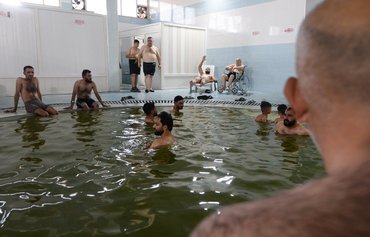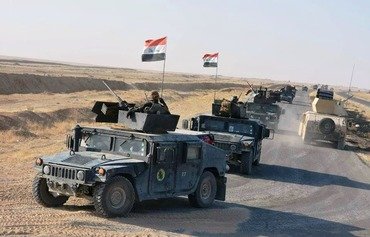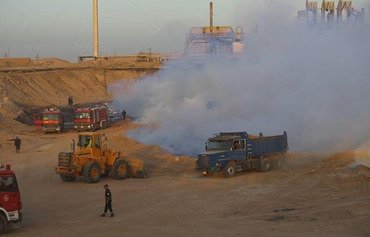Residents of Hamam al-Alil, a town south of Mosul liberated from the "Islamic State of Iraq and the Levant" (ISIL) earlier this month, told Diyaruna horrific stories about their lives under the group's rule.
Former policeman Majid Shakur said he lived a "bitter life" under ISIL, moving from one place to another for fear of persecution, as ISIL elements were targeting army, police and even government employees.
"I had to spend days in the open without food or drink, and sometimes I would hide in a hole I dug in the house of one of my relatives," he said.
"I went through moments where I wished for death," he said, adding that ISIL gunmen were detaining people and torturing them to death in prisons.
"ISIL turned government offices in our sector into detention centres where various forms of torture are practiced," Hamam al-Alil resident Laith Mohammed told Diyaruna.
Residents heard that ISIL had thrown many young men from the town into these prisons on various pretexts, he said, particularly former security personnel whom the group had accused of collaborating with the government.
"Some of the victims were crucified on electricity poles in the city centre, killed by firing squad or slaughtered by knife," he said.
"The fate of anyone trying to bury them was death," he added. "We could see dogs eating the corpses."
Mass graves uncovered
During their search of Hamam al-Alil, Iraqi forces found a mass grave where the group had buried its victims .
The grave was discovered on November 7th near the College of Agriculture, said Ninawa Operations Command spokesman Brig. Gen. Firas Bashar Sabri.
"It included the remains of about 70 bodies, mostly scattered, of citizens that were former members of the army and police, as well as other civilians," he told Diyaruna.
"Some residents were able to identify their slain children themselves, through their belongings, and there are tests currently being conducted to find out the identities of the rest of the victims," he said.
"Most of those detained by ISIL in the Hamam area were residents of al-Hood and Lazakah villages," said Ninawa provincial council member Abdul Rahman al-Wakka.
"The discovered grave includes citizens who are victims from these two villages, where a violent popular uprising took place days prior to the arrival of security forces when 11 [ISIL] gunmen were killed, including leaders"," he said.
Exposing civilians to harm
Al-Wakka expressed his concern that ISIL elements would harm or kill more civilians in reaction to the group's defeats at the hands of Iraqi and coalition forces.
There have been many reports from residents of the liberated areas south of Mosul that detail how ISIL had kidnapped their children or family members, al-Wakka said.
"They do not know where they are and what happened to them," he said.
Hamam al-Alil residents described how ISIL elements shielded themselves behind residents while retreating before the advance of the security forces.
Sabri confirmed that this had indeed been the case.
"During our progress in the Hamam area, we freed hundreds of families who were being held by ISIL and used by them as human shields ," the Ninawa Operations Command spokesman said.
"We provided relief and first aid to those residents and sent them to their original home areas," he said. "Most were from the villages south of Hamam al-Alil and had been forced by the group to flee with it to avoid the targeting of its elements."
"The people of Hamam lived a dark and terrifying life during the ISIL era, and with their salvation today, they are destined for a new life," Iraqi MP for Ninawa province Ahmed Madloul al-Jarba told Diyaruna.
"This group is an enemy of humanity and does not know mercy," he said. "Its violations of the rights of the local residents are among many crimes committed against the innocent."

![Women and children from the Ninawa province town of Hamam al-Alil gather around members of the Iraqi forces to receive food items in early November. [Photo courtesy of the Sunni Endowment]](/cnmi_di/images/2016/11/30/6653-Iraq-hamam-alil-600_384.jpg)






